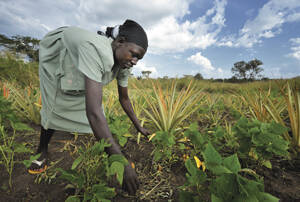Representatives of Catholic organizations at the World Social Forum in Dakar, Senegal, said that massive foreign investment in large tracts of land across Africa—“land grabbing,” according to detractors—is pushing small farmers off their land and threatening another worldwide food crisis.
Martin Brockelman-Simon, executive director of Misereor, the German bishops’ development agency, estimated that up to 48 million arable acres have been bought by interests outside of Africa since 2006. Foreign investors are using fertile or resource-rich African land to grow crops that can be exported to other countries or used for biofuel production, or for mining interests. “These deals are causing loss of food supply, social conflicts, depletion of water supplies, loss of jobs and ecological damage,” Brockelman-Simon said.
“Food crops, such as jatropha, that can now be used for agro-fuels have become a very valuable commodity,” said Rene Segbenou, president of the Benin-based National Network for Sustainable Management of Genetic Resources. “This is driving the push by foreign investors to buy up more and more land for the production of agro-fuels, as this has become a very lucrative business.”
“Recent massive land grabs targeting tens of millions of acres for the benefit of private interests or third states...violate human rights by depriving peasants, pastoralists and fishermen of their means of production, by restricting their access to natural resources or by removing their freedom to produce as they wish,” said a draft statement prepared by delegates at the six-day conference that ended on Feb. 11. Among those working on the statement were representatives of Misereor, Caritas Senegal, the Senegal bishops’ Justice and Peace Commission and the Food First Information and Action Network.
Would-be private investors in Africa often suggest that Africa has huge swathes of unused and vacant lands that can be turned into easy profits, said Ruth Hall, a senior researcher at the Institute for Poverty, Land and Agrarian Studies in Cape Town, South Africa. She said one company even claims that the purchase of African land is socially responsible, but Hall called Africa’s purported land overabundance a marketing myth. Land that sometimes appears vacant is usually used by tribes or nomadic cattle herders, who need access to land to survive, she said.
Land-grabbing is relatively easy in Africa because few traditional communities maintain formal title to land that has often been used communally for generations. The Rev. Alphonse Seck, vicar general of the Diocese of Dakar and executive secretary of the Senegal bishops’ Justice and Peace Commission, said customary land tenure systems must be given greater recognition. “We must not allow a new form of impoverishment of the masses that tramples on the rights of people to land,” he said. The delegates’ statement calls for national governments in Africa to cease what amounts to collusion with land-grabbers and to “implement an effective framework for the recognition and regulation of land rights for users through consultation with all stakeholders.”
Placide Mukebo, coordinator of the Office of Development in the Diocese of Lubumbashi, Congo, said that land-grabbing by foreign mining companies is causing an exodus of small farmers to the cities. “The farmers are either forced off the lands, or they agree to go, but they don’t get adequate compensation,” he said. Mukebo said that 34 of the 51 farming communities the diocese has worked with have been displaced from their land in the last 10 years. Only seven communities held legal titles to land.








